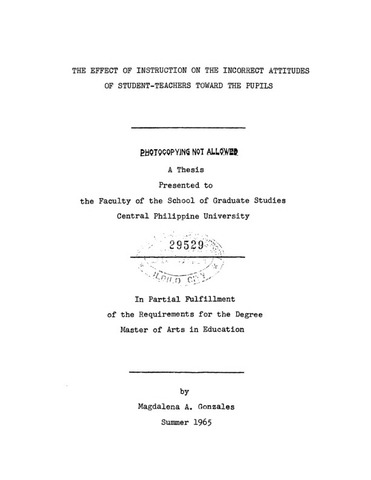The effect of instruction on the incorrect attitudes of student-teachers toward the pupils

Page views
427Date
1965Author
Thesis Adviser
Defense Panel Chair
Share
Metadata
Show full item record
Abstract
Both layman and expert have long recognized that abiding attitudes are among the most important outcomes of the regulated experience which the school tries to confer. Although they are generally considered as "by-products," there has been a growing tendency to view them as equal or superior to the apparent primary objective of any course of instruction.
It is the motivating and guiding effects of attitudes and values that make them so important in human affairs. They instigate and then sustain complex behaviors over long periods of time. They guide and cast an emotional coloring to many of one’s everyday routine. of character formation.
Teachers in training have the obligation to become skilled not only in methods of teaching but also in learning to understand the children with whom they will work. They need to know not only the principles of human development and of psychology related to teaching but also to apply these principles to the analysis of individual situations.
Student teaching is an attempt to bring the prospective teachers into actual situations that they will meet in the teaching field. They are given a chance to deal with the variety of situations and to handle a class in their own right.
One of the principles education students are helped to understand is that no two individuals are identical. Every pupil has a pattern of growth all his own. Each is unique, different from all others. The teacher who dislikes children and does not understand them, even though his dislike may be secret or unconscious, will have difficulty in obtaining the confidence and loyalty which are so necessary to successful class management.
Many student teachers view student teaching only as an opportunity for them to learn methods of teaching. They do not see it as one which provides opportunity to develop a high level of competence in all phases of the teacher's work. They fail to understand that student teaching is a part of the total program of professional laboratory experience, contacts with children, youth, and adults which contribute to the understanding of individuals, and guidance in the teachinglearning process.
After working with hundreds of practice teachers who have come under the guidance of the present investigator, she has noted that most of the students know the methods of teaching but lack the understanding of the children with whom they work.
Negative attitudes have an adverse effect on motivation in that they keep the individual away from certain goalstriving situations. A person who has acquired negative attitude towards something cannot learn to like or do that thing until he can be helped to "release the brakes" of his negative evaluation of it.
Numerous experimental studies in recent years have pointed to the possibility of modifying even the most resistant attitudes by the application of appropriate stimuli. The usual method is to administer some measure of opinion to the group then to expose the component members to a definite experience which presumably possesses the power to alter a person’s outlook and finally to administer the opinion measure (or its equivalent) either immediately or after a lapse of time.
Statement of the problem. In her dealings with practice teachers, the investigator observed that most of the practice teachers did not enjoy very much their work with children. It was observed that this fact was due to their incorrect attitudes toward the children whom they were teaching. - The investigator thought it might be worth studying whether or not these attitudes might be improved or changed.
This study represents an attempt to find out the effect of instruction on the incorrect attitudes of these student teachers toward children and to determine the direction of the change, if an effect is observed, during the course of one semester.
In order to find the answer to these questions, the students enrolled in Education N-9, a combined course of observation, participation, and practice teaching, were tested by means of an inventory to discover their attitudes toward children. They were then given direct instruction to help them improve these attitudes and then retested to determine whether or not their attitudes had improved.
The method of the study is the one-group or single group method. Many researchers have used this method and have found it to be of practical value. According to Carter V. Good, this method is considered the simplest and most feasible for classroom use. W. A. McCall of Teachers College, Columbia University, characterizes this experiment as follows:
A. one-group experiment has been conducted where one thing, individual, or group has applied to it some experimental factor and the resulting change or changes have been estimated or measured.
Description
Introduction and statement of the problem
Suggested Citation
Gonzales, M. A. (1965). The effect of instruction on the incorrect attitudes of student-teachers toward the pupils (Unpublished Master’s thesis). Central Philippine University, Jaro, Iloilo City.
Type
ThesisSubject(s)
Department
School of Graduate StudiesDegree
Master of Arts in EducationShelf Location
GSL Theses 378.242 G5892
Physical Description
56 leaves

